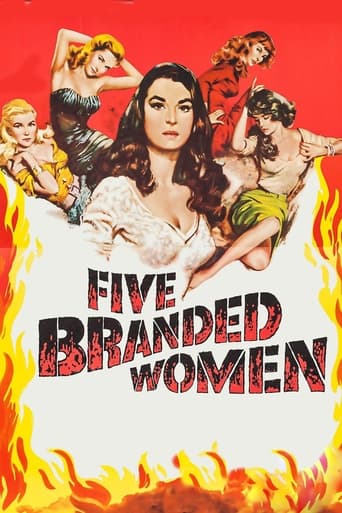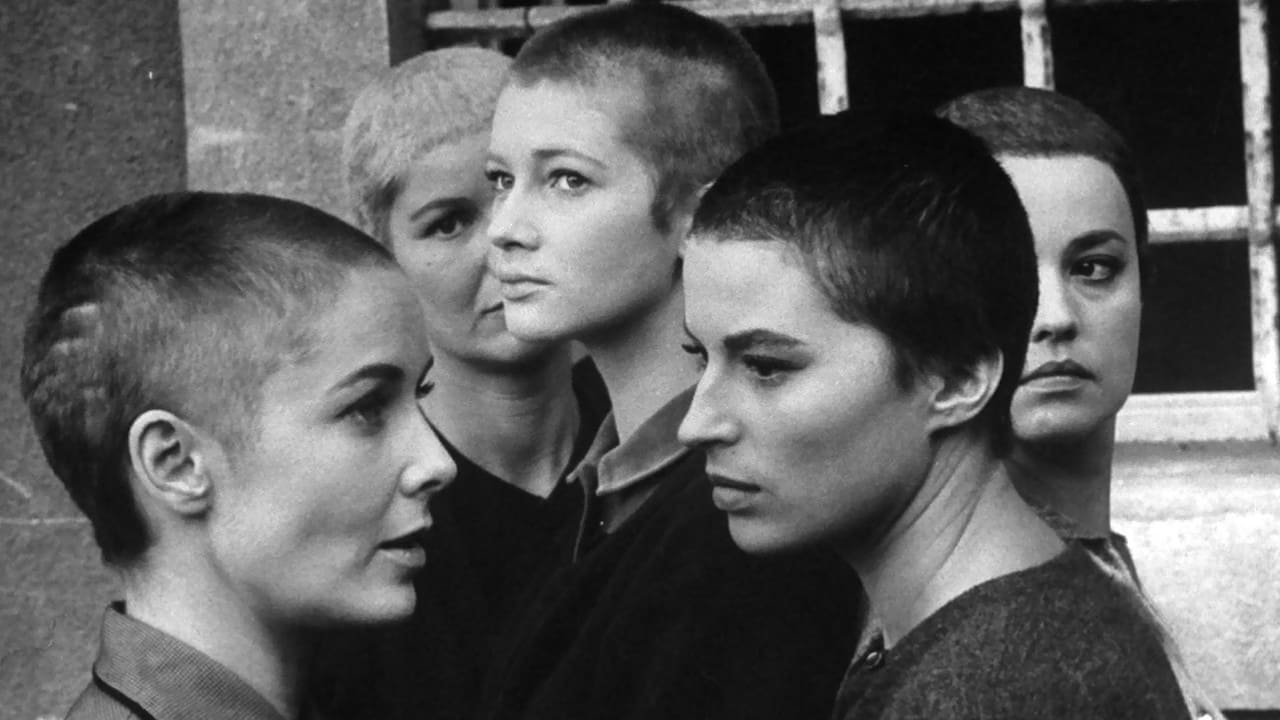bkoganbing
Martin Ritt who partnered with Paul Newman in such films as The Long Hot Summer, Hud, and Hombre did this rather unknown work that was critically well received back in the day, but remains fairly unknown to today's filmgoers. I remember well seeing 5 Branded Women in theater back in the day and never saw it again until very recently.The women are Yugoslavs who have all been seduced and abandoned by one German sergeant played by Steve Forrest. All slept with him for various reasons, all are trying to survive the best way they can. After partisans capture Forrest with one of them, all of them are shorn of their hair as reminders of what fraternization with the enemy means. The five woman so branded are Silvana Mangano, Jeanne Moreau, Vera Miles, Barbara Bed Geddes, and Carla Gravina. Gravina is pregnant by Forrest. The Germans banish the women because they remain walking symbols of partisan reprisals. As for Forrest that son of the fatherland is shorn of something that doesn't grow back.The women stick together because all they have now is each other. Not for long because when a partisan band headed by Van Heflin sees the now armed women deal with a Nazi patrol, they get accepted in the band. But their rules are pretty strict as they all find out.War is a brutal business and guerrillas fighting occupiers make it the most brutal kind of war. The mixed feelings that director Ritt leaves you with, you are supposed to have. You watch 5 Branded Women and especially if you are a woman you wonder what you might do to survive.5 Branded Women is both an anti-war film and a film that shows you just what you might have to do to repel an invader. Nice ensemble performances from the whole cast and a strong if mixed message is delivered.
Robert J. Maxwell
Martin Ritt, the director, seemed to handle more than his share of films about contradictory cultural allegiances, and he reveled in them. His background may have had something to do with the interest that developed into his skill. A prep-school educated New York Jew, he played football for Elon College, founded by the United Church of Christ in North Carolina. One wonders what went through his head in the rural South of the 1930s, in the midst of the Great Depression. Whatever it was, it must have contributed to his handling of the textile mills in "Norma Rae." Later, he was swept up in the Red scare of the early 50s and briefly blacklisted when accused by a grocer in Syracuse of donating money to communist China in 1951.Actually, although all of that biographical stuff may sound irrelevant to the exhibit before us, it's not. Judging from his films, Ritt's stint in the poverty-stricken racist South didn't infuse him with a particularly leftist point of view or a hatred of Southerners or capitalism or anything so simple minded. Instead, it seems to have sensitized him to the problems of poverty itself, and ignorance and divided allegiances. It was a complicated dynamic.I'm trying to get out from behind this damned lectern but my shoe seems to be caught on something. Let me give it another tug. There.A handful of famous international female stars in an occupied Yugoslavian village in 1943 are accused of having had what the French of the period called "collaboration horizontale" and Keats called the "season of mists and mellow fruitfulness", with German troops, and specifically with Steve Forrest, an arrogant womanizer who gets the same treatment from the furious villagers as Abelard got for lusting after Heloise.The errant girls get their heads shaved and booted out of town, following which they have more adventures on their journey than Huckleberry Finn. They fall in with a group of Yugoslav partisans fighting the Germans. The partisans have one rule above all others. No fraternizing among the men and women. Or else. Some men, though, are prompted by their glands to act like satyrs grazing on the lawns, and shall with their goat-feet dance the antic hay. Of course, Vera Miles has to go and willingly fraternize with Harry Guardino, who sheds his usual earnest Italian-American screen persona for a properly goatish performance. "We could die tomorrow," he tells the frightened Vera Miles before throwing himself on her. As a matter of fact, he's right, because the partisan leader, Van Heflin, catches them the next morning.Van Heflin is quite good. He usually is, despite his beetling brows and pop eyes. He has an especially good moment when there is a pause in the battling and intrigue and Sylvana Mangano bitterly accuses him of caring about nothing but killing. Heflin has no ready answer. He pauses, gulps, manages to say, "I want . . .", and then quickly walks away. It doesn't sound like much but it's a very neat little scene.There are quite a few scenes in which the women and the partisans talk about human nature, killing, violence, and will there ever be peace or will the war just go on and on and on? The philosophy is strictly routine, and if it weren't for minor touches in the direction and some of the acting -- Jeanne Moreau and Richard Baseheart -- the film would be more ordinary than it is. Carla Gravina has a tall, fey presence that's almost worth the price Steve Forrest pays for impregnating her. Barbara Bel Geddes is miscast. She's not a Yugoslav peasant in black stockings and German boots. She's the well-bred, middle-class illustrator of "Vertigo" and the well-bred, middle-class wife of a Public Health Service officer in "Panic in the Streets." I'm sorry. I just don't see her rolling around in a muddy pig style with some German enlisted man.I don't know why, but I remember seeing this with my brother in a theater on North Broad Street in Elizabeth, New Jersey, when it was released. Something to do with long-term memory. Tell me, Doc, is my hippocampus turning into flan? Give it to me straight. I can take it.
ejmartiniak
This film is one of the least known gems to come from producer Dino de Laurentiis. Five women in war-torn Yugoslavia have their heads shaved for having intimate relations with a German soldier. The five bond and eventually join the partisan group who punished them back in their village. The film documents their fight against the enemy of their homeland, and their internal feelings of remorse, love, and hate. The women all give stellar performances--Silvana Mangano, Barbara Bel Geddes, Vera Miles, Jeanne Moreau, and young Carla Gravina. Van Heflin and Harry Guardino also deliver fine performances, as the leader of the Yugoslav partisan group and the troublemaker of the partisans, respectively. But perhaps the most touching performance comes from Richard Basehart as the German Captain Erich Reinhardt. In the little screen time he has, Mr. Basehart delivers a gem, bringing poignantly to life a gentle widower, plucked from his comfortable life as a university professor to fight in the war. He is captured by the partisans, and bonds with the 5 Branded Women who have been accepted into their group. He had shown sympathy for the women in the beginning of the film after their disgrace was made public, and in captivity, he bonds with them, particularly Mira (Carla Gravina),(whose baby he delivers) and Ljuba (Jeanne Moreau),(who finds herself in danger of falling for him). It takes a special talent to make you care for a character who is supposed to be a "bad guy", and to do it in less than ten minutes of total screen time is an art form. Mr. Basehart was indeed an artist. This is just one touching instance of the emotional exploration of the characters in this movie. Each character comes to life. A very little known film, but a must see. The action and emotion is raw and realistic throughout.
N.L.
From the same director who brought us "Norma Rae" this classic World War II "resistance band fights guerilla warfare against Nazis in the snowywoods" has an interesting twist: they're all women and decked out in leather bomber jackets, crew cuts and machine guns.Jeanne Moreau, Barbara Bel Geddes, Silvana Mangano, and Vera Miles - all shaved, humiliated, and thrown out of their peasant villages for sleeping with the enemy - now have taken arms against that enemy, but the "real" resistance doesn't want them. So these women must fight the men who are against them AND the men who are supposedly on their side, as well as each other.Melodrama, to be sure, but different enough and with a fascinating sub-text, that it has become a "guilty" pleasure.


 AD
AD


